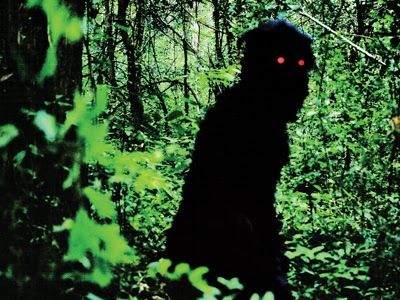Uncle Boonmee arrives on US shores bearing the 2010 Palme d'Or medal from Cannes, that festival's highest honor. It is a leisurely, downright meditative tale — which some will no doubt label "slow paced" — about a terminally ill man reflecting on his present and previous lives. Steeped in Buddhist tradition and theories of transmigration (by which humans, animals and even plants may share their essences with one another), Uncle Boonmee is a strange and challenging but not unrewarding experience.
In the process of reviewing his lives, Uncle Boonmee (Thanapat Saisaymar, who is better known as a roof-welder in Thailand than an actor) and his current family are visited by the ghost of his previous wife and by his long-absent son, the latter of whom has undergone a strange transformation. Boonmee's son has become a "monkey ghost," several of which are present throughout the film and are its spookiest element, especially given their glowing, eerie red eyes. Between his acute kidney failure and spiritual visitations, Boonmee declares at one point "This is a result of my karma; I've killed too many communists."
Uncle Boonmee is written and directed by Apichatpong Weerasethakul, who previously made the somewhat gay-themed 2004 movie Tropical Malady. His new film's plot and pacing may confound Western audiences, especially during an extended sequence in which a disfigured princess has sexual relations with an enchanted catfish. The movie culminates in a dramatically effective family trek to Boonmee's ancestral cave, but ultimately ends on an odd note that can be interpreted as critical of what Weerasethakul considers a contemporary disconnect between nature or spirit and technology. While it doesn't translate into the most persuasive filmmaking, he may well have a point. Weerasethakul also writes perceptively in the film's press notes: "The film reinforces a special association between cinema and reincarnation; cinema is a man's way to create an alternate universe, and other lives."
I Saw the Devil, by Korean filmmaker Kim Jee-woon (A Tale of Two Sisters), is the vicious antithesis to sweet Uncle Boonmee. In its first thirty minutes, a young, pregnant woman is abducted, tortured, murdered and dismembered by a remorseless psychopath. I was tempted to give up on it at that point but I hung in for two more hours through the film's wicked, nail-biting conclusion and, in general, I'm glad I did.
The murdered woman's fiancé, an elite special agent, takes it upon himself to hunt down and punish the killer. In so doing, he naturally risks becoming a monster himself. Attractive Korean superstar Lee Byung-hun, who was also featured in the US production G.I. Joe: The Rise of Cobra, is excellent as the grieving husband-to-be out for revenge.
Between his performance and the screenplay, I Saw the Devil illustrates well how easily regret can morph into retribution.
One can argue that the agent tracks the serial killer and confirms him as his fiancée's murderer a bit too easily, but I Saw the Devil is otherwise intelligent and engrossing though definitely not for the faint of heart. Choi Min-sik (a popular figure in this genre thanks to his role in 2003's similarly brutal Oldboy) is chilling as the Hannibal Lecter-esque villain, who relishes the cat-and-mouse game that develops between himself and his victim's fiancé. Kim Jee-woon's taut direction is superior to many of his international contemporaries, but the film's single best attribute may be the fantastic lighting (especially during a greenhouse confrontation between hunter and prey) and camera work devised by cinematographer Lee Mogae.
Still, it's hard to justify the gruesome carnage that flows throughout I Saw the Devil. As Nietzsche wrote, "He who fights with monsters should look to it that he himself does not become a monster." Filmmakers as well as those dedicated to punishing criminals should follow Nietzsche's advice.
Reverend's Ratings:
Uncle Boonmee Who Can Recall His Past Lives: B
I Saw the Devil: B+
UPDATE: Uncle Boonmee Who Can Recall His Past Lives is available on DVD
Review by Rev. Chris Carpenter, resident film critic of Movie Dearest and the Blade California.





No comments:
Post a Comment